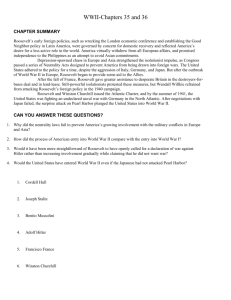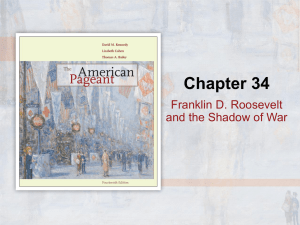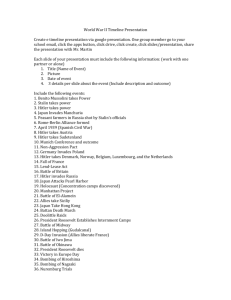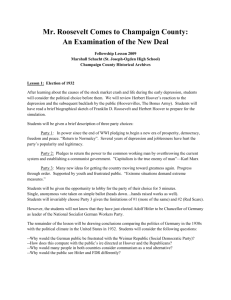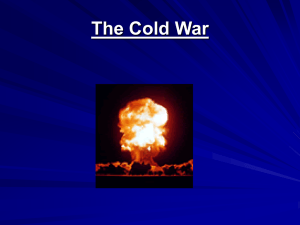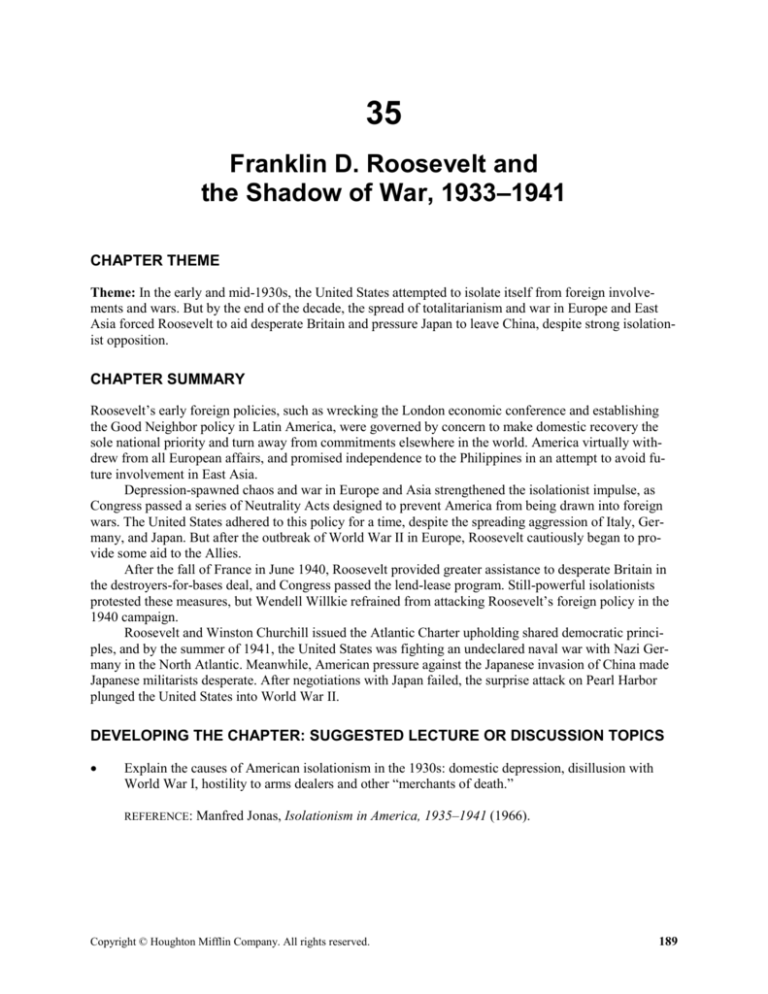
35
Franklin D. Roosevelt and
the Shadow of War, 1933–1941
CHAPTER THEME
Theme: In the early and mid-1930s, the United States attempted to isolate itself from foreign involvements and wars. But by the end of the decade, the spread of totalitarianism and war in Europe and East
Asia forced Roosevelt to aid desperate Britain and pressure Japan to leave China, despite strong isolationist opposition.
CHAPTER SUMMARY
Roosevelt’s early foreign policies, such as wrecking the London economic conference and establishing
the Good Neighbor policy in Latin America, were governed by concern to make domestic recovery the
sole national priority and turn away from commitments elsewhere in the world. America virtually withdrew from all European affairs, and promised independence to the Philippines in an attempt to avoid future involvement in East Asia.
Depression-spawned chaos and war in Europe and Asia strengthened the isolationist impulse, as
Congress passed a series of Neutrality Acts designed to prevent America from being drawn into foreign
wars. The United States adhered to this policy for a time, despite the spreading aggression of Italy, Germany, and Japan. But after the outbreak of World War II in Europe, Roosevelt cautiously began to provide some aid to the Allies.
After the fall of France in June 1940, Roosevelt provided greater assistance to desperate Britain in
the destroyers-for-bases deal, and Congress passed the lend-lease program. Still-powerful isolationists
protested these measures, but Wendell Willkie refrained from attacking Roosevelt’s foreign policy in the
1940 campaign.
Roosevelt and Winston Churchill issued the Atlantic Charter upholding shared democratic principles, and by the summer of 1941, the United States was fighting an undeclared naval war with Nazi Germany in the North Atlantic. Meanwhile, American pressure against the Japanese invasion of China made
Japanese militarists desperate. After negotiations with Japan failed, the surprise attack on Pearl Harbor
plunged the United States into World War II.
DEVELOPING THE CHAPTER: SUGGESTED LECTURE OR DISCUSSION TOPICS
Explain the causes of American isolationism in the 1930s: domestic depression, disillusion with
World War I, hostility to arms dealers and other “merchants of death.”
REFERENCE: Manfred Jonas,
Isolationism in America, 1935–1941 (1966).
Copyright © Houghton Mifflin Company. All rights reserved.
189
190
Chapter 35
Examine the erosion of isolationism in response to the aggressions of Benito Mussolini, Adolf Hitler, and the Japanese warlords. Show the transition in American thinking from indifference to fear
for democracy, as appeasement only fed the dictators’ appetites.
REFERENCE:
David M. Kennedy, Freedom from Fear (1999).
Describe the fierce debates between internationalists and isolationists, especially from 1939 to
1941. The emphasis might be on Roosevelt’s carefully calibrated strategy of increasing aid at each
stage, but never so rapidly as to hand the isolationists a political victory.
REFERENCE: Kenneth
S. Davis, Franklin D. Roosevelt: Into the Storm, 1937–1941 (1993).
Discuss the Japanese-American negotiations and the conflicts that set the stage for Pearl Harbor.
REFERENCE:
Donald Cameron Watt, How the War Came: The Immediate Origins of the Second
World War, 1938–1939 (1989); Paul W. Schroeder, The Axis Alliance and Japanese-American Relations (1958).
FOR FURTHER INTEREST: ADDITIONAL CLASS TOPICS
Focus on the “merchants of death” Nye Senate hearings. Discuss how 1930s isolationism was
strongly aimed at the combating forces that many Americans believed had mistakenly led the United States into World War I.
Examine the rise of Mussolini, Hitler, and the Japanese militarists. Consider how Americans of that
time looked on totalitarianism as a distant horror that the United States should stay away from, no
matter how much they abhorred its values.
Analyze the isolationist-internationalist debate, especially over lend-lease. Point out the isolationists’ argument that such aid would inevitably lead to war and the internationalists’ argument that
helping Britain was the way to stay out of war. Consider whether FDR acted wisely in moving the
United States closer to involvement.
Discuss the causes of the Pacific war from the Japanese point of view. Consider whether the war
was “inevitable.”
CHARACTER SKETCHES
Adolf Hitler (1889–1945)
Hitler was regarded as a vulgar laughingstock in Germany in the 1920s, but he eventually ruled more of
Europe than anyone since Napoleon.
The son of a minor Austrian bureaucrat who was over fifty years old when Adolf was born, Hitler
constantly envisioned himself as a great artist, but his grades and talent were so poor that he failed to get
into a Vienna art school. He later painted pictures and baked them so he could sell them for high prices as
valuable works by old masters.
Hitler was a total failure until he joined the German army during World War I and became completely caught up in the German cause. Through long years of speaking in beer halls, Hitler became adept
at reading audiences. His emotional, ranting speeches had great hypnotic power. Except on matters of war
Copyright © Houghton Mifflin Company. All rights reserved.
Franklin D. Roosevelt and the Shadow of War, 1933–1941
191
and politics, Hitler was totally ignorant and had banal or vicious views that he nevertheless considered the
thoughts of genius.
Quote: “Man has become great through struggle.…Whatever goal man has reached is due to his originality plus his brutality.…Through all the centuries force and power are the determining factors.…” (Mein
Kampf, 1924)
REFERENCE:
Alan Bullock, Hitler: A Study in Tyranny (1962).
Winston Churchill (1874–1965)
Churchill was a powerful British politician and statesman long before his heroic leadership against the
Nazis in World War II.
Churchill’s father was Lord Randolph Churchill, a descendant of the seventeenth-century duke of
Marlborough. Churchill later wrote a biography of his distinguished ancestor, Marlborough. His mother
was an American, and he always cherished his half-American ancestry.
The brash young Churchill dashed around the remote spots of the British Empire at its height in the
1890s, seeking adventure and glory. He found it during the Boer War, and wrote dramatic accounts of
how he escaped from Boers by hiding under floorboards.
Churchill became the powerful first lord of the admiralty during World War I at age thirty-nine, but
the daring Gallipoli campaign in Turkey that he organized proved a disaster. Churchill then lost influence
and spent much of the 1920s and 1930s as a political outcast, until the rise of Nazism gave him a new opportunity. He was stubborn and self-willed, and almost childish in his vanity and outbursts of temper. Yet
he was warm-hearted, generous, courageous, and capable of strong sympathy with others. During the
London blitz, he insisted on sharing the hardships of the people and often wept when he saw bombed-out
houses and churches.
Quote: “We shall fight on the beaches, we shall fight in the fields and streets, we shall fight in the hills,
we shall never surrender.” (Speech, 1940)
REFERENCE: William Manchester,
The Last Lion: Winston Spencer Churchill, 2 vols. (1983, 1988).
Joseph Stalin (1879–1953)
Stalin’s name and picture were everywhere in Russia during his brutal rule, but after “de-Stalinization”
his name and image were completely erased from the Soviet Union.
Stalin’s real name was Joseph Dzhugashvili. He later chose Stalin (steel) as his revolutionary name.
Stalin’s parents sent him to a seminary to become a priest, but he joined revolutionary movements and
was expelled.
At the height of his tyranny in the 1930s, Stalin exiled or killed millions of people, including even
his closest associates and one of his own family members. His second wife committed suicide in 1932,
leaving a letter accusing him of numerous crimes. For many years, all Soviet artists, writers, musicians,
scientists, and others had to sing Stalin’s praises and have their work approved by him. He was suspicious, cruel, and paranoid but could exude great charm on occasion.
Copyright © Houghton Mifflin Company. All rights reserved.
192
Chapter 35
Quote: “It may be asked how could the Soviet government have consented to conclude a non-aggression
pact with such perfidious…fiends as Hitler and Ribbentrop? Was this not an error on the part of the Soviet government? No.…We secured to our country peace for a year and a half and the opportunity of preparing our forces.” (1941)
REFERENCE:
Adam Ulam, Stalin: The Man and His Era (1973).
GREAT DEBATES IN AMERICAN HISTORY
GREAT DEBATE (1939–1941): Isolationism versus internationalism. Should the United States move
away from isolationist neutrality and toward aiding the Allies in the fight against Hitler?
Yes: The internationalists, led by President
Roosevelt and the administration; most bigbusiness leaders and cosmopolitan citydwellers; the Committee to Defend America
by Aiding the Allies, led by William Allen
White.
No: The isolationists, led by the America First
Committee and Charles A. Lindbergh; some
senators and representatives, led by William
Borah, Robert Taft, and Hamilton Fish; some
writers, like Charles Beard and Harry Elmer
Barnes; some small-business and ethnic
groups, especially in the Midwest; some leftists and socialists, led by Norman Thomas.
ISSUE #1: Isolation. Should the United States have any interest in events overseas?
Yes: Internationalist Roosevelt: “It becomes
clearer and clearer that the world will be a
shabby and dangerous place to live in—yes,
even for Americans to live in—if it is ruled by
force in the hands of a few.…I hope that we
shall have fewer American ostriches in our
midst. It is not good for the ultimate health of
ostriches to bury their heads in the sand.”
No: Isolationist poet Oliver Allstrom:
“Over there,” there’s mud and shedding of
blood
And tongues confusing and strange.
So why lend a hand to an alien band
Whose dreams we can never change?
“No, no,” comes the cry from the U.S. sky,
“We’ll never be Allied tools.
Nor again parade in a foreign brigade
Like saps in a squad of fools.”
“And Europe may strut through its bloody rut
And scheme with her Babel-snares.
But we’ll stay home, this side of the foam
And mind our own affairs!”
Copyright © Houghton Mifflin Company. All rights reserved.
Franklin D. Roosevelt and the Shadow of War, 1933–1941
193
ISSUE #2: Democracy. Are the Allies fighting for the same democratic principles America believes in?
Yes: Internationalist Congressman Jerry
Voorhis: “I have an interest in the way of life
wherein free men can freely struggle to better
their conditions, freely worship and believe
according to their own conscience.…I know
that this is not possible in a Nazi- or Communist-dominated nation. So…to aid Great
Britain and the other nations attempting to resist the totalitarians has become part of American policy.”
No: Isolationist Congressman Hamilton Fish:
“The cause for which Hitler has thrown the
German masses into war is damnably unholy.
But the war of Chamberlain and Reynaud is
not thereby rendered holy. The fact that Hitler
is the opponent does not make the Allied war a
fight for democracy.…The Allied governments have no idealism in the conflict, no war
aims worthy of the sacrifice…of their peoples.…”
ISSUE #3: War. Will providing aid to the Allies inevitably lead the United States into war?
No: Internationalist Roosevelt: “There is a far
less chance of the United States getting into
war if we do all we can now to support the
nations defending themselves against attack by
the Axis than if we acquiesce in their defeat,
submit tamely to an Axis victory, and wait our
turn to be the object of attack in another war
later on.…There is no demand for sending an
American Expeditionary Force outside our
own borders. There is no intention by any
member of your government to send such a
force. You can, therefore, nail any talk about
sending armies to Europe as deliberate untruth.”
Yes: Isolationist Senator Arthur Vandenberg:
“When H.R. 1776 [lend-lease] passed the Senate…we did vastly more than ‘aid Britain.’ We
have thrown ourselves squarely into the power
politics and the power wars of Europe, Asia,
and Africa.…We have said to Britain, ‘We
will see you through to victory.’ And it would
be unbelievably dishonorable for us to stop
short of full participation in the war if that be
necessary to a victory.…But I fear this means
we must actively engage in the war ourselves.”
ISSUE #4: War and democracy. Would another war require dictatorial methods and destroy democracy
within the United States?
No: Internationalist Roosevelt: “I reject the
idea that only by abandoning our freedom, our
ideals, our way of life, can we build our defenses adequately, can we match the strength
of the aggressors.…I do not share these fears.”
REFERENCES:
Yes: Isolationist socialist Norman Thomas:
“The method of modern totalitarian warfare is
self-defeating in terms of ideal ends. War itself
is the only victor. Each particular war begets
its more deadly successors. Intolerance, dictatorship, brutality, are its inevitable accompaniments.…”
William Langer and S. Everett Gleason, The Challenge to Isolation, 1937–1940 (1952);
Kenneth Davis, FDR: Into the Storm, 1937–1940 (1993); Wayne Cole, Charles Lindbergh and the Battle
Against American Intervention in World War II (1974).
Copyright © Houghton Mifflin Company. All rights reserved.
194
Chapter 35
QUESTIONS FOR CLASS DISCUSSION
1. Why did the neutrality laws fail to prevent America’s growing involvement with the military conflicts
in Europe and Asia?
2. How did the process of American entry into World War II compare with the entry into World War I?
3. Would it have been more straightforward of Roosevelt to have openly called for a declaration of war
against Hitler rather than increasing involvement gradually while claiming that he did not want war?
4. Would the United States have entered World War II even if the Japanese had not attacked Pearl Harbor?
MAKERS OF AMERICA: REFUGEES FROM THE HOLOCAUST
Questions for Class Discussion
1. In what ways were the refugees from Hitler’s anti-Semitic persecutions similar to other immigrant
groups, and in what ways were they different?
2. How did the earlier history of American Jewish immigration affect the experience of the Holocaust
refugees in America?
3. Was American government policy toward the refugees, and toward the Holocaust generally, an adequate response to the crisis?
Suggested Student Exercises
Use various aids (photographs, films, documents) to illustrate the Holocaust. Consider why many of
the refugees felt grateful to America for providing a haven, but frustrated at their inability to do
more for their fellow Jews.
Use some examples of the work of Jewish refugee artists, composers, scientists, or writers (e.g.,
Marc Chagall, Kurt Weill, Albert Einstein, Hannah Arendt, and Erich Fromm) to illustrate the refugee immigrants’ cultural contribution to America. Consider how such contributions may have differed from the second- and third-generation cultural achievements of some other immigrant groups.
Copyright © Houghton Mifflin Company. All rights reserved.

